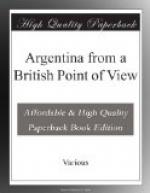This consists of tickets, which are sold at a fixed price, with the name of one of the entries. After the race there is a great rush to the offices, made by those who have bought the winner, to collect their winnings, which are the total receipts, minus a small percentage, divided by the number of those who bought the winner. In this way a very hot favourite will pay very little more than the original purchase money, while an outsider who wins will pay his backers perhaps ten, or even twenty times their deposit. There is also private betting, of course, but no public bookmakers.
The horses are of very good quality, though not up to the standard of the classic races in Europe. A number of youngsters are imported yearly from England and the United States, and among them usually some good selling-plate winners, and one or two that have been placed in first-class flat races. The country also produces some excellent horses, and they are improving every year; the stud farms are already well known in Europe as some of the best in the world. Of these, the most important, perhaps, is the “Ojo de Agua,” so-called from its famous spring, which waters all the stables as well as dwelling quarters. It is the home of the famous Cyllene, whose offspring we expect to see winning races in the near future; Polar Star, scarcely less known, and Ituzaingo, a native of this country, are his present companions; while the remains of Gay Hermit, Stiletto, Pietermaritzburg, and Kendal, all of whom are well known among turf circles at home, rest beneath its soil. There are several other equally famous stud farms, such as the “San Jacinto,” the present home of Val d’Or, who won the Eclipse Stakes from Cicero, the Derby winner of that year; at another, Diamond Jubilee, whose list of victories is long, resided for the latter part of his life.
Nor are the jockeys unworthy of their mounts, and some very fine riding may be witnessed both at Palermo and Hurlingham.
In contrast to these races, run on a well-ordered course, and watched from luxurious stands, are the native “cancha” meetings, held, probably, at some country public-house, and run on a “cancha,” consisting of a soft piece of road, or along a fence where there are no holes. The races consist of matches arranged between two ponies, over short distances. The start is made only by agreement of both the jockeys, and thus many hours are wasted in their manoeuvres to get the advantage of one another at the start. If the judges have money on the loser, the race is often given a dead heat, and has to be run again. The pony of most endurance has usually the best chance of winning, though the race itself is short, as his rival may be tired out by repeated false starts. Large sums of money often change hands at these meetings, as the native is a born gambler, and understands this primitive method of racing better than the more complicated systems of the regular course. Owing to this, and to the competitors’ efforts to cheat one another, not infrequently knives are drawn during the heated discussion which follows the race.




